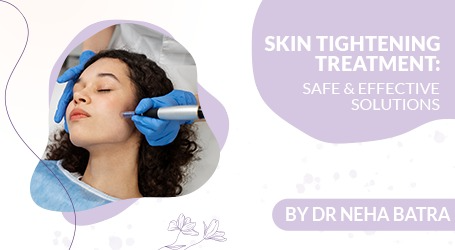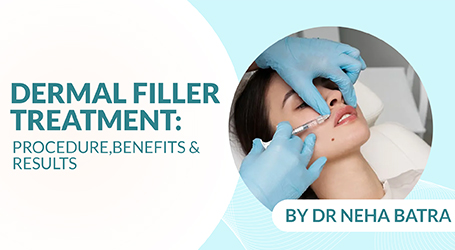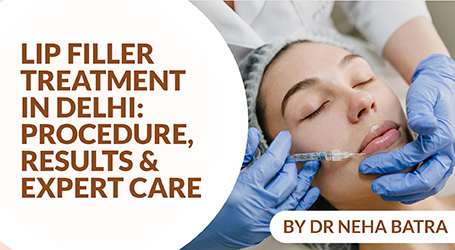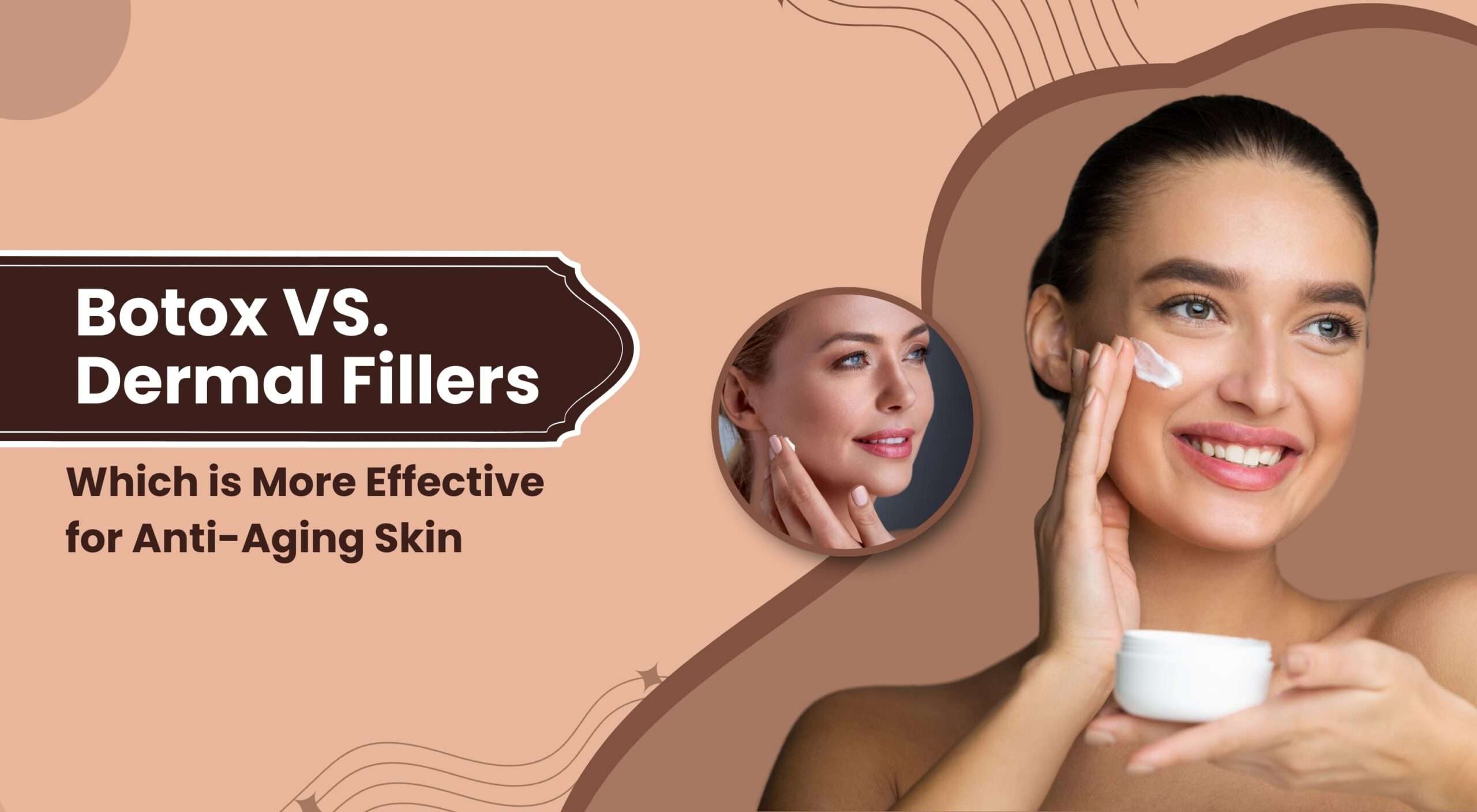
Want to reverse the signs of aging and regain a youthful appearance? Botox and dermal fillers are two popular nonsurgical options that can help. But how do you know which one is right for you? In this blog, we’ll break down the differences between Botox and dermal fillers, highlight their benefits, and potential side effects, and guide you in choosing the best option to achieve your anti-aging goals.
Let’s explore these treatments to help you make an informed decision.
What is Botox?
Botox is the short name of botulinum toxin, a protein that temporarily relaxes the muscles underneath your skin. It is mainly used on wrinkles and fine lines formed due to muscle movement. It is particularly on the forehead, between the eyes-called crow’s feet-between the eyebrows, commonly referred to as frown lines.
How Botox Works
Botox works by blocking the nerve signals that cause muscles to contract. When injected into targeted areas, it temporarily paralyzes the underlying muscles, preventing them from moving. This smooths the skin above, reducing the appearance of wrinkles and fine lines.
The result is a more youthful, relaxed look without the need for invasive procedures, making Botox a popular choice for facial rejuvenation.
Benefits of Botox Treatment
- Smoothes wrinkles: Suitable for dynamic wrinkles caused by muscular activity.
- Fast procedure: Botox injection only takes about 10-15 minutes.
- Minimal downtime: The patient can return to regular activities immediately after the treatment.
- Temporary results: The outcomes last for about 3 to 6 months.
What are Dermal Fillers?
Dermal fillers are gel-like products that can be injected under the skin to restore lost volume, smooth wrinkles, and enhance the facial silhouette. They are most often used to treat static wrinkles, such as deep smile lines, nasolabial folds, or hollow cheeks.
How Dermal Fillers Work
Dermal fillers add volume to the skin, filling in wrinkles, plumping up cheeks, and enhancing lips or other facial features. Some attract moisture, such as Hyaluronic Acid (HA), providing a more youthful and hydrated appearance.
Benefits of Dermal Fillers
- Instant result: Visible results following the treatment.
- Restorative volume: Suitable for the cheeks and lips as well as under the eyes.
- Long-lasting: Some fillers last up to 18 months or longer, depending on the product.
- The treatment is versatile for both wrinkles and volume loss.
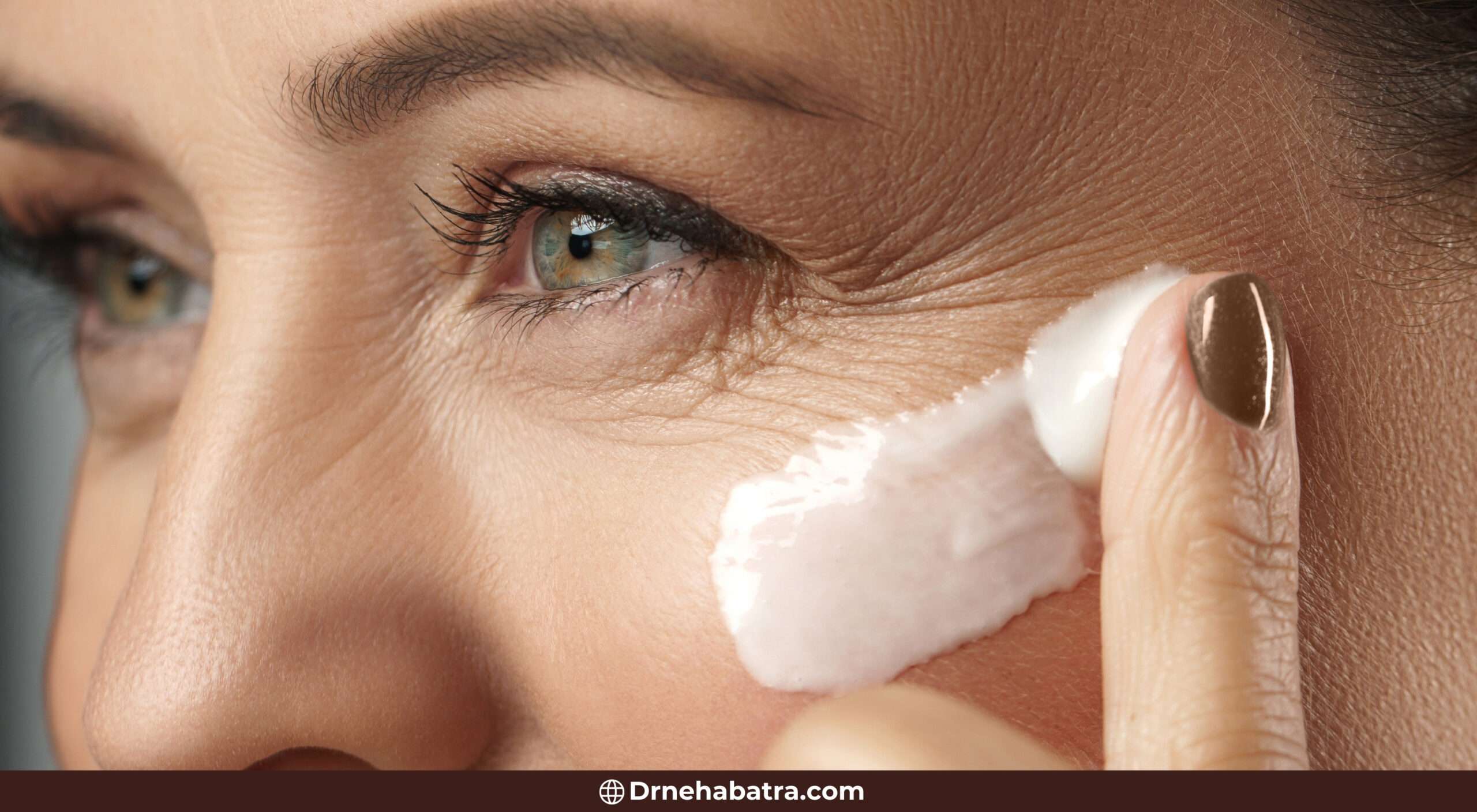
Add Image Here
Botox vs. Dermal Fillers: Key Differences
Feature | Botox | Dermal Fillers |
Purpose | Smooths wrinkles caused by muscle movement | Adds volume and smooths static wrinkles |
Target Areas | Forehead, crow’s feet, frown lines | Cheeks, lips, under eyes, nasolabial folds |
Treatment Duration | 10-15 Minutes | 15-30 Minutes |
Results | Lasts 3-6 months | Lasts 6 months to 2 years |
Recovery Time | Minimal, No Downtime | Minimal, Some Swelling Possible |
Side Effects | Mild bruising, Headaches | Bruising, Swelling, Lumps |
Which One is Right for You?
The choice between Botox and dermal fillers would depend on your specific anti-aging goals, areas of the face that you want treated, and the kind of wrinkles you aim to correct. And this simple guide is here to help you decide which one could be the best fit:
- If you care about wrinkles and lines brought about by facial expressions, then Botox would be the best option. It is used to treat dynamic wrinkles, including crow’s feet, frown lines, and forehead creases.
- Dermal fillers are great options if you would like to restore volume in regions of your face that have lost fullness over time, for example, in the cheeks, under the eyes, or lips. Dermal fillers can also help older, deeper wrinkles that still show up when your face is at rest.
- Botox is fantastic for those cosmetic neophytes who just want something quick to get rid of wrinkles without much downtime; it smoothes out wrinkles with very quick results.
- If you’re looking to fill in a more permanent basis around the cheeks or the mouth, your best bet tends to be dermal fillers since the results of those tend to last longer than those of Botox.
Common Side Effects and Risks
Botox and dermal fillers are considered safe if offered by an appropriately qualified practitioner; however, they are not without their potential side effects and risks. Here’s a breakdown of the common side effects and risks associated with both Botox and dermal fillers.
- Botox: The bruising at the injection site, headache, drooping eyelid (unlikely), or temporary numbness.
- Dermal Fillers: The bruising, swelling, redness, or lumps at the injection site. On extremely rare occasions, infection or vascular occlusion could be on the cards.
Conclusion
The choice between Botox and dermal fillers would simply depend on your individual needs. If you have targeted wrinkles caused by facial movements, then choose Botox. If you want to restore volume and smoothen static wrinkles, then dermal fillers might be the better option.
The best results are accomplished with proper diagnosis and consultation with a qualified and experienced dermatologist or cosmetic surgeon, who assesses your skin and suggests the best
Related Blogs
Skin Tightening Treatment by Dr. Neha Batra Clinic – Safe & Effective Solutions
Dermal Filler Treatment by Dr Neha Batra: Procedure, Benefits & Results
Lip Filler Treatment in Delhi: Procedure, Results & Expert Care
Best Laser Hair Reduction Clinic in Delhi: Cost, Safety & Results at Dr Neha Batra Clinic
Anti-Aging Treatment in Delhi: Options, Benefits & Results
Frequently Asked Questions
Botox costs depend on the area treated and the brand used.
Yes! Botox and dermal fillers can be used in combination to provide comprehensive rejuvenation of the face. Botox can relax dynamic wrinkles, while dermal fillers replenish lost volume, thereby giving a fresher youthful appearance.
Results are usually shown 3 to 7 days after Botox treatment.
Results from the dermal fillers are immediate, though swelling and bruising may take several days to resolve.

